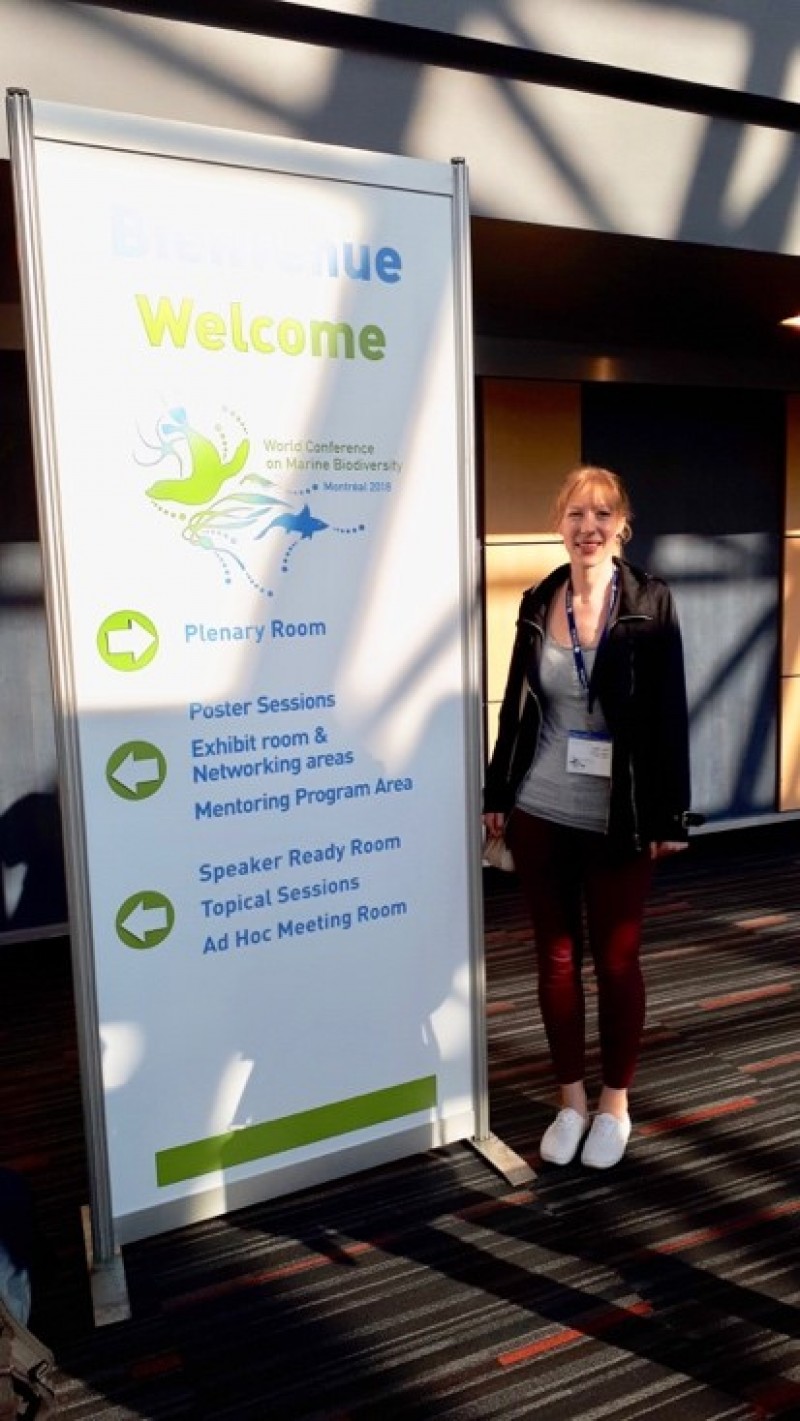4th World Conference on Marine Biodiversity
Emma John
University of Sheffield

Thanks to the generous support of the Challenger Society for Marine Science I was able to attend the 4th World Conference on Marine Biodiversity (WCMB) in Montreal, Canada this May.
The theme of this year’s conference was ‘Connecting with the living ocean’, with sessions ranging from big data tools in marine biodiversity to hydrothermal vent ecology and marine policy and stewardship, all with the aim of finding the best ways to combine knowledge to combat the cumulative threats currently facing the world’s oceans. The breadth of the conference made narrowing down the list of talks I wanted to see a challenge! As well as attending talks relevant to my own field of research I made the most of the opportunity to attend sessions in different disciplines. I particularly enjoyed the talks given by industry representatives who presented a non-academic perspective on the applications of marine research and the research-policy interface.
On the second day of the conference I presented my PhD work on global phytoplankton sensitivity to climate variability. My research attempts to bridge the gap between marine and terrestrial ecology by showing trends in responses to climate change which hold across realms. Having previously presented the work to terrestrial audiences it was very exciting for me to see what a marine audience would make of it. The talk went really well and I received some really interesting feedback which I can take forward and apply in my future work.
Another amazing opportunity came with the conference mentoring program. I was teamed with 6 international students/early career scientists to look in-depth at integrative frameworks and holistic assessments for marine health, with a focus on progress made in indicator development, ocean connectivity and large-scale biogeography as we head towards the Aichi 2020 Biodiversity Targets. We had several workshops and panel discussions during the conference with the other mentoring theme groups and are now working on a perspectives paper of research priorities for the next 10 years.
Not all was your standard conference fare at WCMB. Dr Linwood Pendleton gave an amazing play in three parts for his opening plenary on ‘Rethinking Marine Conservation Science’ with the help of piano (Robert Hodge) and poetry (Anna Zivian), and a contemporary dance on the plight of marine biodiversity loss closed the last conference session. On the third night of the conference they took a gamble on the weather and instead of a formal conference dinner we had food trucks in the sunshine on the water front, followed by doughnuts, wine and the awards ceremony. It was a great end to the conference!
Attending and presenting at WCMB enabled me to network with and gain feedback from world leaders in my field and make valuable connections for future collaborations. It also enabled me to meet and discover the research of North American academics who don’t always travel to European conferences. I am extremely grateful to the Challenger Society for the opportunities this experience has provided me with.
Profile: I am a third year PhD student in the Department of Animal and Plant Sciences at the University of Sheffield. My research focusses on determining the effects of environmental variability on marine biodiversity and identifying patterns which carry into the terrestrial realm using a big data approach. So far, I have used global satellite data for temperature, wind and radiation to produce a global index of phytoplankton sensitivity to climate variability. I am now moving on to look at the relationship between this index and patterns of higher tropic level marine biodiversity.
Latest News
Royal Society Publishing Photography Competition 2025
Please see a message from the Royal Society below:
We are delighted to announce that the 2025 Competition is now open for entries until 15 August for a chance to win £1000! The competition celebrates the power of photography in conveying the wonder of science happening all around us and photographs can be submitted in the categories of: Astronomy, Behaviour, Earth Science and Climatology, Ecology and Environmental Science, and Microimaging.
The competition is free to enter and open to anyone studying or working in science at graduate level or above. Category winners will receive a one-year membership to the Royal Photographic Society and the overall winner will receive a grand prize of £1,000. Find out more: https://bit.ly/RSPphotocomp
October 2025 MEDIN Workshop: Marine Data Management, Governance and the MEDIN toolset
The Marine Environmental Data and Information Network (MEDIN) are pleased to announce that registration is now open for the next occurrence of our popular free online training workshop: ‘Marine Data Management, Governance and the MEDIN toolset’ on the 13th – 17th October 2025 on OceanTeacher Global Academy.
Marine Data Management, Governance and the MEDIN toolset
The Marine Environmental Data and Information Network (MEDIN) and OceanWise are delighted to invite you to attend our popular free online training workshop: ‘Marine Data Management, Governance and the MEDIN toolset’ on the 19th – 23rd of May 2025.
